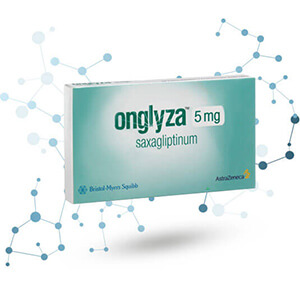Onglyza Overview
 Onglyza® (saxagliptin) is a prescription drug that helps regulate blood sugar in type 2 diabetes patients. It belongs to a class of oral hypoglycemic drugs called dipeptidyl peptidase-4 (DPP-4) inhibitors, otherwise known as gliptins. Along with a healthy diet and exercise, the right medication can keep type 2 diabetes symptoms well-managed in most patients. Of course, no prescription drug comes without some side effect risks. Severe joint pain, pancreatic inflammation and heart problems lead some Onglyza patients to file lawsuits against the drug’s manufacturer, AstraZeneca. But before we get to that, we’ll explain how DPP-4 inhibitors help lower blood sugar in our Onglyza overview below.
Onglyza® (saxagliptin) is a prescription drug that helps regulate blood sugar in type 2 diabetes patients. It belongs to a class of oral hypoglycemic drugs called dipeptidyl peptidase-4 (DPP-4) inhibitors, otherwise known as gliptins. Along with a healthy diet and exercise, the right medication can keep type 2 diabetes symptoms well-managed in most patients. Of course, no prescription drug comes without some side effect risks. Severe joint pain, pancreatic inflammation and heart problems lead some Onglyza patients to file lawsuits against the drug’s manufacturer, AstraZeneca. But before we get to that, we’ll explain how DPP-4 inhibitors help lower blood sugar in our Onglyza overview below.
Onglyza Overview: How DPP-4 Inhibitors Regulate Blood Sugar
When you eat, your body produces a hormone called incretin. Once incretins appear, that triggers beta cells inside your pancreas to start secreting insulin (which lowers blood sugar). Almost immediately, the DPP-4 enzyme starts removing incretin hormones from your body. That’s how this process works when people who don’t have diabetes ingest food. However, type 2 diabetics may not produce enough incretins to trigger that much-needed insulin release, so their blood sugar remains high. Because DPP-4 inhibitors block those enzymes, incretins can stick around until the pancreas eventually releases insulin. Those incretins sticking around also tell your pancreas to wait a little bit longer before releasing a hormone called glucagon. When your body produces glucagon, it signals your liver to produce more sugar and then release it into your bloodstream.
Onglyza effectively treats type 2 diabetes patients because it mimics the naturally occurring hormone and enzyme processes found in non-diabetics. In other words, DPP-4 inhibitor drugs like Onglyza don’t effectively lower high blood sugar for type 1 diabetics. Onglyza and other DPP-4 inhibitors help keep blood sugar within a targeted range without causing either hypoglycemia or weight gain. In fact, AstraZeneca’s marketing materials initially touted Onglyza over other popular diabetes medications for not encouraging weight gain. Unfortunately, after-market studies and FDA adverse event reports recently raised concerns about Onglyza’s safety during long-term use.
Next, we’ll review studies indicating Onglyza isn’t as safe as previously believed, and whether those risks outweigh the drug’s benefits.
Onglyza Overview: Studies Show Increased Cardiovascular Risks
Among Onglyza’s minor side effects are a runny or stuffy nose, sore throat, cough, headache, diarrhea, vomiting or stomach pain. More concerning to patients and physicians alike, however, are Onglyza’s severe health complication risks, including heart failure and pancreatic cancer.
The 2013 SAVOR-TIMI 53 study found a possible link between Onglyza and increased risk of heart failure. Researchers conducted the 16,492-patient study to learn whether Onglyza could provide heart-protective benefits for type 2 diabetics. While researchers noted Onglyza didn’t cause heart attacks, they did find a 27% increased risk of hospitalization for heart failure. Even more upsetting, Onglyza use potentially increased “all-cause mortality” risks for type 2 diabetics. In other words, Onglyza appeared to make subjects with other risk factors like kidney impairment far more likely to die.
After reviewing SAVOR study results, the FDA issued a 2014 Drug Safety Communication about Onglyza’s potential link to heart failure. The agency ordered AstraZeneca to update Onglyza’s warning to include the increased risk for heart failure or other cardiovascular events. But for many type 2 diabetics reporting cardiovascular complications from Onglyza between 2009 and 2014, these warnings came too late.
Onglyza Overview: Pooled Data Review Shows Increased Pancreatitis Risk
Scientists and medical professionals sometimes include DPP-4 inhibitor medications within a broader category known as “incretin-based drugs.” In 2015, UK researchers examined pooled data from three large clinical trials involving the DPP-4 inhibitors saxagliptin, sitagliptin and alogliptin. In all studies, subjects given Onglyza, Nesina or Januvia were twice as likely to develop severe pancreatitis vs. the placebo. And while researchers emphasized the risk, though detectable, was still quite small, AstraZeneca updated Onglyza’s warning label to include pancreatitis. (Pancreatic inflammation can cause pancreatitis, which may require hospitalization and eventually result in death.) Over time, pancreatitis can evolve into pancreatic cancer — a diagnosis that’s often rapidly fatal due to its late-stage detection.
Onglyza Overview: Litigation Heats Up Over “Failure to Warn” Allegations
In May 2017, 14 New Jersey plaintiffs filed lawsuits against Onglyza’s manufacturer, AstraZeneca, and Kombiglyze XR manufacturer, Bristol Myers-Squibb. Plaintiffs allege defendants disregarded a 2008 FDA recommendation calling for clinical trials to determine cardiac risks in diabetes drug users. According to lawsuit filings, AstraZeneca and Bristol-Myers Squibb knew about saxagliptin’s increased heart failure risks, yet failed to warn consumers. In 2016, the FDA required both companies to revise their drug warning labels for Onglyza and Kombiglyze XR. The FDA also issued a drug safety communication to inform consumers about increased cardiovascular risks for diabetic patients taking saxagliptin.
Check eligibility for compensation.
If you or a loved one developed heart damage, pancreatitis or pancreatic cancer while taking Onglyza, you may be entitled to compensation from the manufacturer. Request your free case evaluation now to see if you may qualify.
